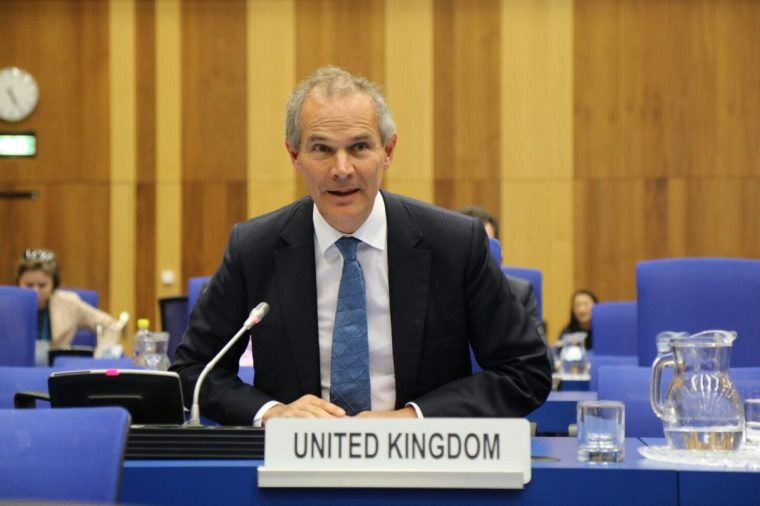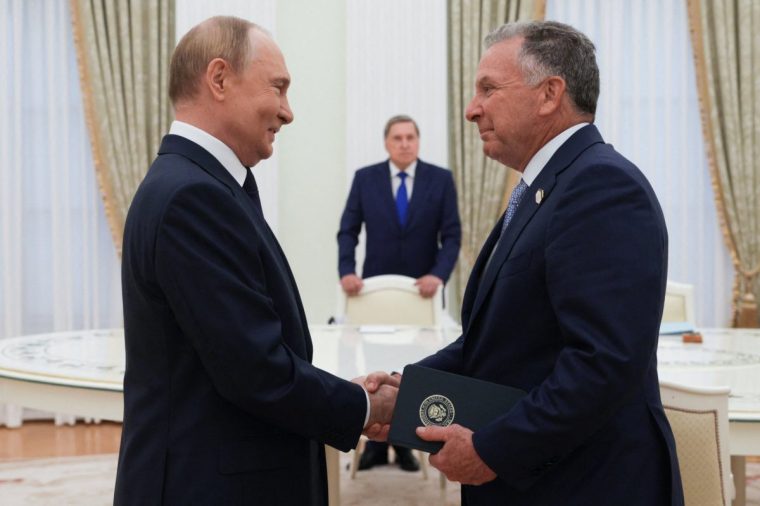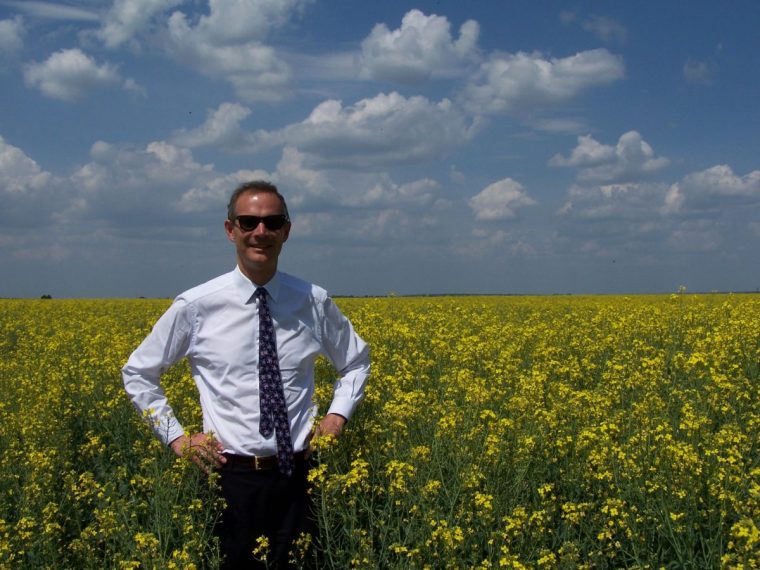There are plenty of big reasons for Ukrainians to worry about whether Donald Trump will cede too much ground – literally – to Vladimir Putin during their summit on Friday.
Yet Trump is nothing if not unpredictable. If he were to surprise the world by securing concessions from the Russian dictator in Alaska on Friday, leading to a ceasefire and a reasonable peace deal, how might he do it?
For any hope of a diplomatic victory, the US leader needs to unleash some of his Madman Theory chaos now, in the final days and hours before their meeting, by massively ramping up pressure on the Kremlin.
That’s what Leigh Turner, a former UK ambassador to Ukraine, would strongly advise the White House if he were involved in preparing for the negotiations.
Turner, who led the British embassy in Kyiv from 2008 to 2012 and has also served in Moscow, says that “Trump’s unpredictability is potentially a weapon… but only if he is prepared to get tough.” Suddenly hitting Russia now could “greatly increase the chances of Putin being prepared to negotiate seriously”.
Announcing major new arms supplies to Ukraine is one option. “Although Russia has been doing well in the war in recent months, it’s still more or less in the balance, and major new arms supplies to Ukraine could make a real difference,” says Turner.
“As soon as possible, Trump should impose massive new sanctions on Russia,” he adds, especially on its oil trade, which has helped keep the country afloat. The US could follow the UK in targeting Russia’s “shadow fleet” of ageing tankers, for example.
The US President could also squeeze countries importing Russian oil, as he did last week by announcing an additional 25 per cent tariffs against India, saying Narendra Modi’s Government doesn’t “care how many people in Ukraine are being killed by the Russian War Machine”.
“Without that kind of pressure, the chances of making any progress or getting any kind of deal that will be halfway acceptable to Ukraine will be more or less zero,” the ex-ambassador warns. “Unless they approach the negotiations from a position of strength, we’ll just see Putin winding Trump around his little finger.”

How Putin manipulates Trump
Turner, author of the book Lessons in Diplomacy, tries to maintain faith that talks with dictators are never a foregone conclusion – if they are handled smartly.
“There’s always this belief that large authoritarian powers never change their position… But if you present good arguments, you can always win around even the most implacable power.”
However, he fears that Putin’s superior preparatory work will enable him to manipulate his adversary once they are in a room together.
“Usually, leaders are thoroughly briefed and familiar with their negotiating opponent’s foibles, what their strengths and weaknesses are. Clearly, Putin is highly experienced in this, and I have no doubt his advisors have produced a massive dossier on exactly how to get what you want from Trump.”
“Perhaps Trump is sitting down right now, studying a detailed dossier of how to get what you want from Putin,” says Turner. “However, the impression is that he’s much more a seat-of-your-pants kind of guy, who believes in his own intuition in getting the best possible deal… It’s a pretty unconventional way of handling complex international negotiations; it’s very unsettling.”
Normally, diplomatic “sherpas” from both sides meet for weeks or months before a meeting like this, so that leaders can simply thrash out final details and go through formalities when they meet. But there is little sense of any substantial work like that having taken place this time, besides a few flights to Moscow by Trump’s envoy Steve Witkoff.
Without firm parameters being set by aides and the core basis of any deal being sketched out in advance, “the risks are potentially great,” especially because “Putin is a master of flattering Trump, an effective ‘Trump whisperer.’ I’m hoping Trump has learnt from this.”
Indeed, the Russians have been canny in buttering up the US President for months. In March, Witkoff said that Trump was “clearly touched” on being told that, after Trump came within millimeters of being killed by an assassin’s bullet last year, Putin was “praying for his friend” with a priest in his local church after. That led Witkoff to conclude that Putin is not a “bad guy.”
Witkoff also brought a painting of Trump back from Moscow, a “personal gift” from Putin, which the US aide said was a “beautiful portrait” by a “leading Russian artist.”
The past record from the pair’s meetings is also concerning. After they sat down together in Helsinki in 2019, Trump even sided with the Russian leader against his own intelligence agencies – trusting Putin’s denial of meddling in the 2016 presidential election, rather than the FBI’s conclusions that Russia had interfered in the campaign.
“Putin almost invariably gets everything he could possibly want and more from Trump. Every time they talk, Trump comes out using Russian language – calling Volodymyr Zelensky a dictator, for example, or questioning his democratic credentials.”

How Trump weakened Ukraine’s position
When Turner retired from the UK Diplomatic Service in 2021, he outed himself as thriller writer Robert Pimm. Aged 67, he continues to write fiction, now under his own name, and is an avid blogger.
But years out from his embassy work – which included serving at the UN and as UK ambassador to Austria – he still follows international affairs closely and remains a vocal supporter of Ukraine.
Although he wants to be optimistic about Friday’s talks, he still fears that Trump will “back the aggressor and give them everything they want.” He was deeply alarmed when Trump’s Defence Secretary, Pete Hegseth, suggested in February that it was “unrealistic” for Ukraine to aim to return to its pre-2014 borders.
Turner was relieved when Trump finally began to criticise Putin. The US President stated in June that he was “disappointed” with the Russian leader, explaining: “We’ll have a great conversation. I’ll say: ‘That’s good, I’ll think we’re close to getting it done,’ and then he’ll knock down a building in Kyiv.”
Nevertheless, the former diplomat worries that for Trump, “getting a deal is more important than the quality of the deal itself.”

Worries over worst-case scenario
Turner thinks the most likely outcome is that Putin fobs off Trump for now with some vague promises, keeping talks alive without major Ukrainian giveaways. Perhaps this would even allow more time for a frustrated US to harden its position against Russia.
He believes the worst-case scenario would be the US agreeing to border changes, with Russia absorbing Crimea and vast areas of eastern Ukraine.
“That really would be pretty much a catastrophe for the security of Europe, and, in my view, the US also… It would really be a green light for Russia to launch future attacks, not only on Ukraine, but perhaps also on other neighbours. I’m thinking of Kazakhstan, Moldova, in a worst case, maybe even Estonia or other Baltic states.”
It could also embolden other states to launch attacks on neighbours, such as China invading Taiwan – and encourage nations such as Saudi Arabia to build nuclear warheads.
“The message to every country in the world is going to be: unless you get nuclear weapons, your nuclear-armed neighbour can do whatever the hell they want. That’s a that’s a chilling message.”
One thing he does not expect is for Trump to explode with the same kind of anger seen during “the slow-motion car crash of Trump’s meeting with Zelensky in the Oval Office” back in February.
“That was an almost surreal example of a meeting going off the rails. It’s much less likely with Putin, because Trump seems to be in awe of him. It’s difficult to see how Trump could treat Putin in that way – and it’s difficult to imagine that Putin would give Trump the opportunity.”
‘Lessons in Diplomacy: Politics, Power and Parties’ by Leigh Turner is out now in hardback and will be released in paperback on 16 September (£14.99, Policy Press)
